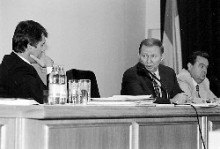To tell the truth, the President did not spare the vainglory of even a single fuel-and-energy executive. He outlined more clearly the functions of Naftohaz Ukrainy and stressed it was not its duty to purchase gas abroad. Mr. Kuchma upbraided the government for this, for the latter has not yet concluded contracts on gas supplies in this and next years. But the overall gas situation, as depicted by the President, also reflected great dissatisfaction with Naftohaz and Ihor Didenko, the acting chairman of the board of directors. “I am already ashamed to look Mr. Putin in the eyes because of the non-sanctioned takeoffs of gas,” the President said. “Viakhirev (president of the Russian Gazprom —Ed. ) phones me in this connection and asks: are you mad, what are doing?” According to Mr. Kuchma, we have already “eaten up” in this way 13 billion cu. m. of gas worth $700 million, paying back $80 for each thousand cubic meters of the pilfered gas. What is more, we have to pay this from the state budget which does not provide money for this. So Russia may even take us to an international court.
As time goes by, things in Naftohaz are still far from perfect. According to the President, there is still no documentary evidence that 10 billion cu. m. of the Russian transit gas have passed through the territory of Ukraine. So Russia, as Mr. Kuchma said, is protecting its own economic interests from “such managers,” introducing limits on oil supplies as punishment for gas pilferage. National oil refineries are now loaded 12% less than before. “How are we going to reap the harvest?” the President asked Viktor Yushchenko, hinting that good relationship with Kazakhstan does not mean oil will flow in by itself: “We must go to them.”
The President noted he was not going to make staff replacements during this meeting. He said final conclusions will be made later, when the fuel- and-energy complex reports for six months of its work. The sector leader, Vice-Premier Yulia Tymoshenko, was mildly rebuked for the fact that the complete freedom of actions she was vested with was utilized unsatisfactorily and only led to 28 Cabinet discussions, 11,000 directives and instructions, and public disputes among government members who never rose above the level of a debate club in this question, being clearly fixated on the new schemes of the energy market. At the same time, the President noted that the governmental committee on power sector reformation is still making attempts to win political dividends; its work smacks of amateurishness, while true experts are not being involved in this thing. The impression is that the President has already made a decision but is going to announce it not so soon.
Yevhen Marchuk, Secretary of the National Security and Defense Council (NSDC), pointing out in his speech that situation in the fuel-and-energy complex presents a threat to Ukraine’s national security, made a well-grounded conclusion that one of the factors that caused this is non-fulfillment by the government of the Presidential Decree which put into practice the NSDC decision on urgent measures to overcome the crisis in Ukraine’s fuel- and-energy complex (FEC). Mr. Marchuk noted, among other things, that the top-priority measures the government had drawn up to put the FEC in order yielded no results, while the accumulation of gas debts, for which the government is to blame, creates tense moments in negotiations with Russia, giving the latter additional levers of pressure on Ukraine. According to Mr. Marchuk, the government should have reduced surrogate payments for energy resources in a gradual and balanced way, while the one-off measures the government undertook only deepened the crisis of payments, which has paralyzed the economy and caused a financial thrombosis. The NSDC secretary also raised the still-unresolved question of the social significance of the rates of housing and utility charges. Therefore, in his opinion, the population has fallen hostage to conflicts in the FEC, which can finally lead to an increased social tension.
Analyzing the FEC practice of managerial decision-making, Mr. Marchuk pointed out the sector has two competing centers of management, although the law reserves this function for the ministry of fuel and energy, now stripped of initiative and responsibility for the state of affairs. The existing system, according to Mr. Marchuk, has proved ineffective, for it only functions by way of strong-will and empirical decisions, without taking into account the opinion of experts and scientists. Mr. Marchuk underlined that unless a system of control over the activities of the Cabinet staff is set up, the knot of problems will remained uncut and the current merry-go-round in the power sector will continue. This idea was also supported by Mr. Kuchma in his concluding speech. He advised the government not to procrastinate with decision- making and said that even an imperfect but timely made decision is much better than no decision at all. The Day ’s sources also note that at the end of the meeting the President praised, and deservedly so, the successes of Sumy governor Volodymyr Shcherban. It may be interpreted as a warning to Ms. Tymoshenko.







